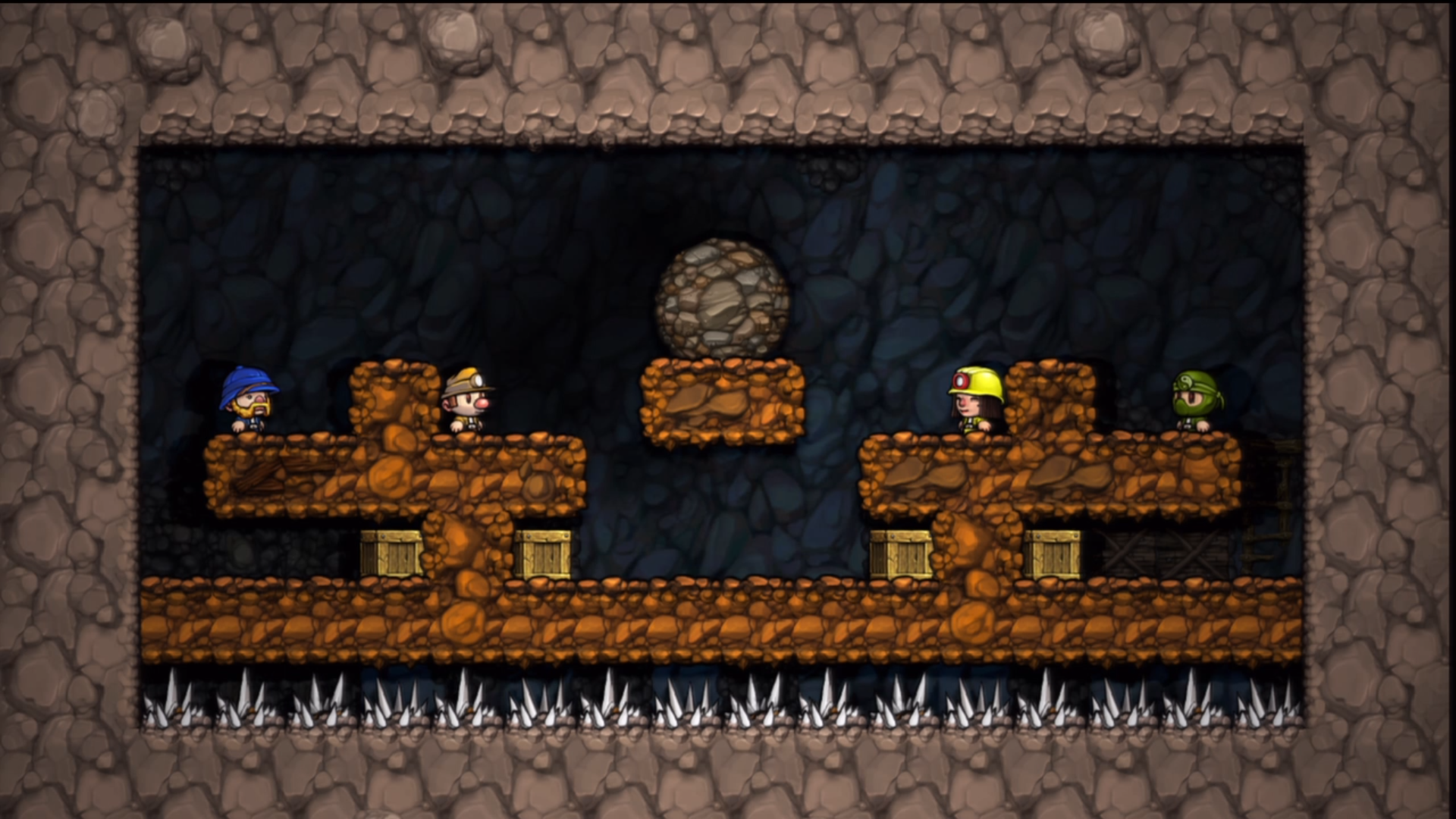Derek Yu on the state of indie and his new book about Spelunky
PCG: There’s a section in the book called ‘feedback loop’ where you write that Spelunky was a small idea that quickly grew organically. That seems like an ideal situation for a creative person. Is that a hard phenomenon to trigger? Do you work for it, or does it arrive in a fit of inspiration?
DY: You definitely have to put in the work. Start with small ideas and try making them. What I found is that I’d often hit a wall, so I’d go back and think about what I’m going to do again, find a new idea, mix and match some existing ideas I’ve already had and go back at it. You hit a wall, and then you hit another, and eventually you get to an idea where everything seems to fit and you just start flying.
That’s kinda how it was with Spelunky: I had all these prototypes before Spelunky, and they were all really exciting at the start but pretty soon you hit a wall. Once I started working on Spelunky I never hit the wall, I just kept going and going, and there kept being more interesting avenues to explore with it. I don’t think I would have just come across it without working on the previous prototypes, which meant sitting down and making games. I definitely advocate actually making games, getting your hands dirty, because that’s the only way to really figure out what sticks. There are so many ideas that sound good in your head, but when you start working on them they aren’t [that good].

PCG: Spelunky's Deathmatch mode is one of my favourite competitive games. You write in the book that you were surprised people didn’t pick it up more. Why do you think they didn’t?
DY: It’s a good question. I think it was because people just didn’t play it the way Andy [Hull, Spelunky programmer] and I did while we were developing it, where it was just much more tactical. We didn’t chuck bombs all over the place, we’d wait for that perfect opportunity and try to take out the person when they were vulnerable. Whereas I think most people who tried deathmatch, and maybe multiplayer in general – especially for a game like Spelunky where the deathmatch was never really a part of the core game to begin with – I think expectation played quite a big part. I feel like that’s on us, to get players to understand how to “play the game” properly. I definitely don’t blame the players or anything like that. I think a lot of people do have a lot of fun with it, as a more casual thing. It may also be that adventure mode is more compelling than deathmatch mode.
PCG: We’ve got a tournament going in the office. We play 1v1, 12 bombs, 4 ropes, and everything else on default except the ghost, target and AI is toggled off. We find it very tactical with those settings.
DY: It’s possible that there are people out there having a lot of fun with deathmatch and it’s just not really being broadcast on the internet where I would be able to find out. I tend not to watch a lot of Spelunky streaming anyways, kinda for the same reason I don’t play it: it’s just slightly stressful for me. I usually just watch the highlights people send me. I think it’s also the case that deathmatch isn’t a very well-explained mode. It’s just there and it’s up to you to figure out what to do with it.
The biggest gaming news, reviews and hardware deals
Keep up to date with the most important stories and the best deals, as picked by the PC Gamer team.
PCG: There have been some impressive Spelunky runs: someone killed the ghost, someone got the eggplant to Yama, recently there was a no gold pacifist run. It feels like the community has done everything in this game, but is there any other devious challenge you could set?
DY: Oh boy. I don’t think there is! Nothing that’s really within reason. I joked about people playing it blindfolded but I don’t really suggest that, actually. I don’t think Spelunky has enough audio cues to let you do that without a tonne of luck. I said it in the book: people have already completely surpassed our expectations in terms of what can be done in the game. The limits of the game, or what we thought were the limits, aren’t the limits at all – they’ve been surpassed by people like Bananasaurus Rex. At this point anything people do is new and surprising to us.
PCG: Did you expect Spelunky to be such a great spectator sport?
DY: I didn’t, though I hoped that it would. With Spelunky Classic, I really thought the random nature of the game would limit it as a competitive game, but it’s not been a problem at all – if anything the random nature has made it more exciting for speedrunners and challenge runners. Someone released a speedrun of the original Spelunky and broke down exactly what they were thinking at each spot, and talked about how they used the randomisation to their advantage, how they accounted for the randomisation. There is such a thing as increasing your luck with the randomisation by doing certain things, and that gave me hope that Spelunky would be pretty competitive, despite or because of the randomisation that’s involved in it.
PCG: You begin to have an innate feel for how the levels are constructed after a while.
DY: That’s the thing that I didn’t necessarily know would be true, working on the game. I think I had a certain intuition about it too, it just seems to work because despite the randomisation it’s not complete chaos. There’s enough in Spelunky that’s handmade versus random or procedurally generated that from run to run, you never see the exact same formations, but you find familiar ones.
PCG: I’ve found in my time playing Spelunky that the Black Market is the easiest place to kill the shopkeepers, thanks to the Ankh room. It’s very easy to lob bombs safely down there. Was that deliberate?
DY: It wasn’t deliberate but it’s one of those things where I quickly realised that it’s easy to get them there. I didn’t plan it that way per se, it’s just one of those things where it happened to work out, which was the case for a lot of Spelunky. Intuitively I design things a certain way without understanding necessarily why I was doing it that way, but after playing it or having other people play it and watching other people play it, I kinda understood why I did it. As I’m working on a game, I don’t necessarily have these strict ideas in mind, it’s more like feelings. It’s why you have to make a lot of games and spend a lot of time doing it, to build up that intuition. Then I think making games feels more like drawing, which also feels more right and satisfying, and you feel like you’re putting more of yourself into it. It’s better than thinking in terms of nitty-gritty design rules.
PCG: I know that Spelunky is feature complete and you’ve moved on, but is there any potential to get Steam Workshop support for it? There are third-party map creation tools out there.
DY: To be honest I haven’t thought too much about it. Andy Hull (programmer for Steam + Xbox) would have to want to do it. I’m certainly cool with people using editors and stuff to mod the game with, but I don’t know about Steam Workshop – there would have to be a lot of demand for us to go and muck around in that code again. At this point we’re pretty happy to move on.
PCG: Are you working on something at the moment?
DY: Yeah, we’re working on a few different things, but unfortunately nothing is far enough along that I can really reveal what it is. The book has taken up a lot of my time during the past year, or over a year. Now that’s winding down I’m spending more time on games again.
PCG: Are you working alone on the prototyping and conception?
DY: A little bit. It’s hard to say that I’m in solitude now because I have a daughter, so I feel like I’m never alone anymore. I’m also working with other people on things. I’m doing a little bit of the totally solo prototyping which I did when working on Spelunky, but it’s definitely not the same. So much is different now. One is that, like I said in the book, Spelunky really kind of came about because of Aquaria in a way, because I wanted something that was different from Aquaria. That was such a difficult development for me and Alec Holowka [co-creator of Aquaria], so I really needed to decompress and make something very small. I don’t feel that as much with what I’m working on now, because Spelunky, even though every game development is very challenging, I think the development of Spelunky was a challenge that was much less exhausting for me on a mental and spiritual level.

Spelunky by Derek Yu is available through Boss Fight Books on March 29, in both digital and physical editions. Preorders are open now.
PCG: What games are you playing at the moment?
DY: I haven’t been playing as many games as I have in the past. Mostly I’ve been playing smaller indie games and mobile titles, because those are the ones that fit my lifestyle more now. Being a parent, I spend a lot of time parenting and when I have free time I want to work, and so my time for playing video games is a lot more limited. I have to sneak it in. Most of last year I played a tonne of Puzzle & Dragons. I think a lot of people saw me Tweeting about that, and thought “why are you playing that?” It’s actually a really good game. It’s quite rewarding in terms of requiring a pretty high level of skill to master and all that. There’s a lot of variety and the fundamental mechanics of the game are very interesting, it’s an extremely innovative extension on basic match three mechanics. I don’t play it as much now, but last year I played it a lot.
Other than that I’ve mostly been trying smaller games out. Though I was playing The Witness for quite a bit. That’s the thing, longer form games I have trouble with because I’ll enter a period where I can’t play it much and it’s hard to get back into. What I played of the Witness was really good.
PCG: Who’s your favourite Spelunky character?
DY: You know, I think I usually just play as the Spelunky guy, the main character. I actually like the little purple girl with the glasses.
PCG: She’s my favourite, too!
DY: I also like the purple pirate girl. There’s something about purple. Usually I play as Spelunky guy, though. But I do like the underdog characters, I like to play the more interesting or underused ones. I used to play Ken in Street Fighter 2 a lot, but I moved to Dudley in Street Fighter 4 because he was a much more interesting and underused character.

Shaun Prescott is the Australian editor of PC Gamer. With over ten years experience covering the games industry, his work has appeared on GamesRadar+, TechRadar, The Guardian, PLAY Magazine, the Sydney Morning Herald, and more. Specific interests include indie games, obscure Metroidvanias, speedrunning, experimental games and FPSs. He thinks Lulu by Metallica and Lou Reed is an all-time classic that will receive its due critical reappraisal one day.

